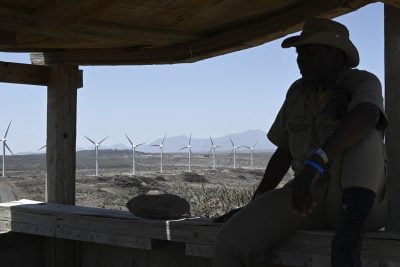When greeting a visitor, the Baganda people of central Uganda will often ask “eradde?” – literally, “is the lake calm?” It is an understandable choice of metaphor. The vast body of water that the Baganda know as Nalubaale, and English-speakers call Lake Victoria, can become treacherous in sudden storms.
The processors in Uganda that export fish from the lake have also experienced turbulence ranging from market swings to climatic fluctuations and environmental pressures. At one time there were over 20 fish factories operating in Uganda, mostly exporting Nile perch fillets, but that number had fallen to just five in 2017 after a dramatic decline in fish stocks.
There has been a recovery since, spurred partly by the harsh enforcement of fishing regulations, and 12 processing companies are now in operation. But the industry continues to be buffeted by challenges, says Sujal Goswami, the general manager of Karmic Foods and chairman of the Uganda Fish Processors and Exporters Association (UFPEA).
“There has been a substantial decline in the resource that we need for the factories,” he says. “We are operating below 20% of our capacity. You see this lake has not been properly taken care of for many years.”
Apart from the perennial problem of overfishing, the catch has also been affected by rising waters, which last year reached their highest level since records began more than a century ago. Unusually deep waters have disrupted fishing practices and may have also contributed to the mysterious die-off of Nile perch this year – an occasional phenomenon which Baganda fishermen call kaliro, believed to result from deoxygenation.
Then there is Covid-19. The virus created logistical challenges and reduced demand in major export markets such as Spain and Italy, says Goswami. Overall, he says, the situation for Ugandan fish factories is “the worst of all time”. Exports by UFPEA members fell from $128m in 2019 to $73m in 2020, a 43% decline.
And yet fish exporters believe that, with the right management, there is still plenty of potential in Uganda. Fish factories employ over 5,600 permanent workers. The entire fish value chain creates jobs for more than a million people, including fishermen, transporters, boat-builders and others. Fish products are Uganda’s second-largest export after coffee, discounting the re-export of smuggled Congolese gold.
Dwindling stocks
Local people have fished in Lake Victoria for centuries. But commercial fish factories only took off in 1991, when the government banned the export of unprocessed Nile perch. It also removed a state monopoly on fish processing, and privatised the single government-run factory. Foreign firms, many of them Indian-owned, started to set up shop.
The early years were not plain sailing. In the late 1990s the EU thrice imposed bans on Ugandan fish exports, due to concerns about salmonella, cholera, and the use of poisons. “This was a big lesson for us as a country to understand and appreciate the role of standards in meeting market access,” says Paul Omanyi, assistant commissioner at the Directorate of Fisheries Resources in the Ministry of Agriculture.
The fish factories and the government strengthened testing systems, with support from the EU. A Belgian company called Chemiphar was invited to set up a standards laboratory in Kampala. Between 2000 and 2006 the value of fish exports rose sevenfold.
But soaring sales created another problem: overfishing. The fish processors are not allowed to operate trawlers on the lake, so the entire catch comes from artisanal fishermen in small wooden boats. Fishermen generally sell to traders, who in turn sell Nile perch to exporters, while also dealing in local and regional markets.
By the mid-2000s, it was clear that this entire chain was stretched by dwindling stocks. Fishermen were catching immature fish using finely-meshed nets. Goswami says that the processors introduced a self-policing mechanism in 2007, where factories refused to take fish below 20 inches in length.
Economic woes remain after Museveni win
On a high: Growing cannabis in Uganda
Import substitution makes a comeback in Africa
But demand continued to rise from neighbouring countries, like the Democratic Republic of Congo and South Sudan, and from China – where the swim bladder, known as the fish maw, is thought to have medicinal properties.
In 2017 President Museveni called in the only institution he really trusts: the army. A new Fisheries Protection Unit, manned by soldiers, was tasked with enforcing regulations on the lake.
“At the end of the day what is important is to eradicate or at least reduce the illegalities that are happening,” says Goswami. “In a country like ours we need to see that people actually have some kind of a fear about operating such illegalities.”
Some of the fishermen’s leaders were also supportive of the move. “The industry had collapsed because there was no management, so we thought that maybe the army can come in,” says Godfrey Ssenyonga Kambugu, the chairman of the Association of Fishers and Lake Users of Uganda (AFALU), which has about 3,000 members.
The army arrested anyone it found breaking the rules. Fishermen accused soldiers of beating them and even barging their canoes, causing several people to drown. “People were not used to this enforcement,” says Kambugu, who nonetheless supports the army’s involvement. “There were some excesses.”
At Kasenyi landing site, near Entebbe, there is little enthusiasm for the army’s actions. “They take your boat, your gear, your engine, and they imprison people,” complains Abubaker Kasirye, a fisherman, who points out that there are few other options to make a living. “What the government is doing is not bad, but the people they sent are handling it badly.”
Fish farming
The army’s intervention helped fish stocks to recover, but few consider it to be a long-term solution. A new fisheries bill, tabled in parliament in March, plans to create a chief fishing officer to oversee the sector, increase penalties for illegal fishing, and establish a paramilitary surveillance unit, similar to the wildlife rangers that manage national parks.
Meanwhile the government is trying to encourage the growth of aquaculture, or fish farming. Omanyi, the assistant commissioner, says that Uganda currently produces about 120,000 tonnes of fish from aquaculture each year, but hopes to raise that to 1m tonnes by 2030. He notes that almost a fifth of Uganda’s surface area is covered by fresh water.
As part of that plan, the government is currently designing two “aquaparks”, in Apac and Kalangala districts, which will house hatcheries, feed stores, nursing ponds and production units. The focus will be on tilapia and catfish, with capacity at each site to produce 40,000 tonnes a year. The parks will be run as a public-private partnership, and the government is currently looking for an operator.
“These are models that we have seen in Vietnam, in Thailand and in Bangladesh,” says Omanyi.
For now that idea only exists on paper. But some businesses seem to share the government’s enthusiasm for fish farming. In 2019 the aquaculture firm Yalelo, which also operates in Zambia, started growing tilapia in cages in Lake Victoria.
Yet the expansion of tilapia farming will not fundamentally alter the dynamics of the export industry, which is focused on Nile perch caught from wild stocks. The problem of managing the lake sustainably while also protecting the livelihoods of the people who work there is yet to be adequately solved. The sector has survived tough times in the past. It faces more choppy waters ahead.
Want to continue reading? Subscribe today.
You've read all your free articles for this month! Subscribe now to enjoy full access to our content.
Digital Monthly
£8.00 / month
Receive full unlimited access to our articles, opinions, podcasts and more.
Digital Yearly
£70.00 / year
Our best value offer - save £26 and gain access to all of our digital content for an entire year!
 Sign in with Google
Sign in with Google 



